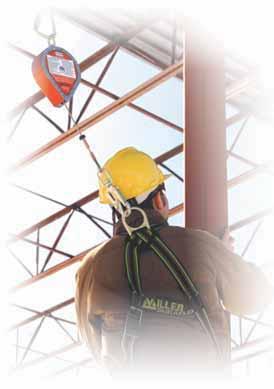
2 minute read
General Q&A Benefits of Rental vs Ownership Disclaimer
221 HOLIDAY INN DRIVE, CAMBRIDGE ON N3C 3T2 PHONE: 1-800-477-5732 FAX: 1-519-651-1663 EMAIL: SERVICE@FALLCON.CA
GENERAL Q&A
Q: What is the difference between Visual inspection and recertification in fall protection?
A: Inspection is typically a visual process performed prior to use and on a periodic basis. Recertification is a process which typically involves engineering review of the original design, load testing and other activities in order to “certify” a system.
Q :Can I write on my Harness / Lanyard?
A: The “Sharpie” brand of felt-tip marking pens from Sanford, Inc. uses a type of permanent ink that will not cause deterioration to nylon and polyester webbing. This is the only brand of marker that DuPont has tested and approved.
Q: Is there a expiration date for my harness and/or lanyard?
A: CSA standards require that the user remove the equipment from service if it has been subject to the forces of arresting a fall. There is no expiry date for Fall Arrest items, They also states that when inspection reveals defects in, damage to, or inadequate maintenance of equipment, the equipment shall be permanently removed from service or undergo adequate corrective maintenance before return to service.
Q: How often should I inspect my gear?
A: Any using fall protection equipment must inspect their gear per the user manual instructions prior to each use, is it also required that a competent person other than the user complete a thorough inspection of the product at least annually and record the results.
Q: Is there a specific height at which point fall protection is required?
A: This depends upon province; Alberta - 3.0 m; BC - 3.0 m; MB - 3.0 m; NL - 3.05 m; NB - 3.0 m; NS - 3.0 m; NT/NU - 3.0 m; Ontario: (Construction, Industry, Mining, Window Washing): 3.0 m; PE - 3.0 m; QC - 3.0 m; SK - 3.0 m; YU - 3.0 m.
BENEFITS OF RENTAL VS OWNERSHIP
• No annual certification costs – CSA Z259 standards • Reduce Capital expenditure • Current Models • Technical Support • Minimize cost / costly breakdowns • No Maintenance costs • Eliminates storage costs • Versatility - Ability to match equipment with specific job application • Frequency of need vs ownership • 24/7 Emergency Service/Support • Field Service / Troubleshooting
DISCLAIMER
Section 26.2(1) of the Construction Projects Regulation requires employers on construction projects to ensure workers are adequately trained on the use of a fall protection system if they may use the system on the job. These workers must be given adequate oral and written instructions by a competent person.
Requirements for training and instruction under subsection 26.2(1) of the Construction Projects Regulation must be completed, in addition to an approved working at heights training program. It covers aspects specific to each work site or construction project.
Employers also have a general duty under clause 25(2)(a) of the OHSA to provide information, instruction and supervision to a worker to protect the health and safety of the worker.







